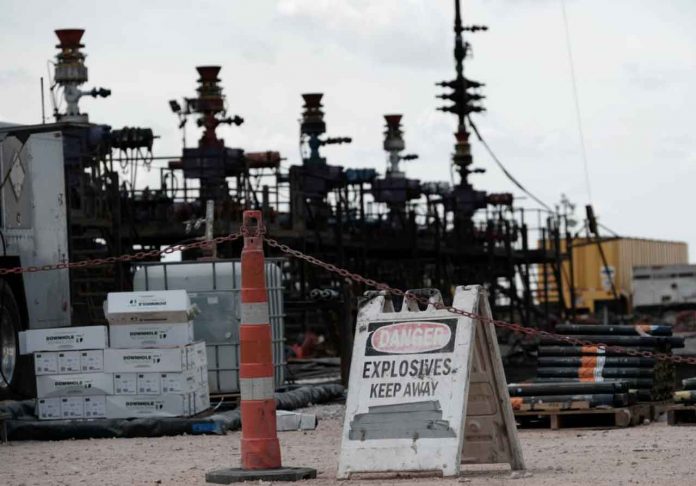
The gas extraction technique risked causing too much disruption to local communities through earth tremors, officials said
By Stephen Addison and Alistair Smout
LONDON (Reuters) – Britain will impose an immediate moratorium on fracking, the government announced on Saturday, saying the controversial gas extraction technique risked causing too much disruption to local communities through earth tremors.
The move could win support for Prime Minister Boris Johnson’s Conservatives in constituencies in northern England where fracking had been planned but was dismissed by the opposition Labour party as a “stunt” ahead of December’s election.
The government had previously signaled its support for the shale gas industry as it seeks ways to cut Britain’s reliance on imports of natural gas which is used to heat around 80% of Britain’s homes.
But fracking, which involves extracting gas from rocks by breaking them up with water and chemicals at high pressure, is fiercely opposed by environmentalists who say it is at odds with Britain’s commitment to reach net-zero carbon emissions by 2050.
Business Secretary Andrea Leadsom said that the government could not rule out unacceptable impacts on the local communities in the future if fracking continued.
“We’ve always been clear that we will follow the science,” she told BBC radio. “We cannot be certain that shale gas can be extracted safely, and therefore we must impose this moratorium until the science changes.”
Saturday’s announcement comes as Johnson gears up for an election on Dec. 12. Proposals for developing fracking in several marginal seats in northern England will now be postponed.
“The Conservatives’ temporary pause of fracking is an election stunt to try and win a few votes,” opposition Labour party leader Jeremy Corbyn said in a tweet.
“Boris Johnson described fracking as ‘glorious news for humanity’. We cannot trust him. Labour would ban fracking. That’s real change.”
IMMEASURABLE TOLL
The decision follows a report on an incident at a site run by British energy company Cuadrilla near Blackpool, northern England where a 2.9-magnitude tremor shook houses in August.
An anti-fracking campaign by local people emerged as a flashpoint in a growing climate activist movement opposing new fossil fuel projects around the world. Hundreds of protesters have been arrested over the past few years for trying to disrupt Cuadrilla’s operations.
“The toll this has taken on our lives is immeasurable,” said Maureen Mills, from Halsall Against Fracking. “The industry is all about itself and its shareholders. Our communities are left physically and mentally drained and devastated. For what?”
Campaigners resisting a vastly larger fracking industry in the United States also cheered Britain’s decision.
“This is a major step in our global struggle against fracking,” said Xiuhtezcatl Martinez, 19, youth director of climate justice group Earth Guardians who has been opposing the industry in his home state of Colorado for almost a decade.
Fracking in England resumed only last year after two tremors prompted a seven-year moratorium.
The Blackpool incident was examined by the Oil and Gas Authority (OGA), which regulates and promotes Britain’s oil and gas industry.
Its report found it was not currently possible to predict accurately the probability or magnitude of earthquakes linked to fracking operations.
Cuadrilla is 47.4% owned by Australia’s AJ Lucas, while a fund managed by Riverstone holds a 45.2% stake. There was no immediate comment from the company.
“Hydraulic fracturing stimulation is a long-standing technology used around the world,” said Ken Cronin, chief executive of industry group UK Onshore Oil and Gas.
“Going forward, we are fully committed to working closely with the Oil and Gas Authority and other relevant regulators to demonstrate that we can operate safely and environmentally responsibly.”
(Reporting by Stephen Addison and Alistair Smout; Additional reporting by Matthew Green Editing by William Schomberg, Sandra Maler and Peter Graff and Clelia Oziel)
